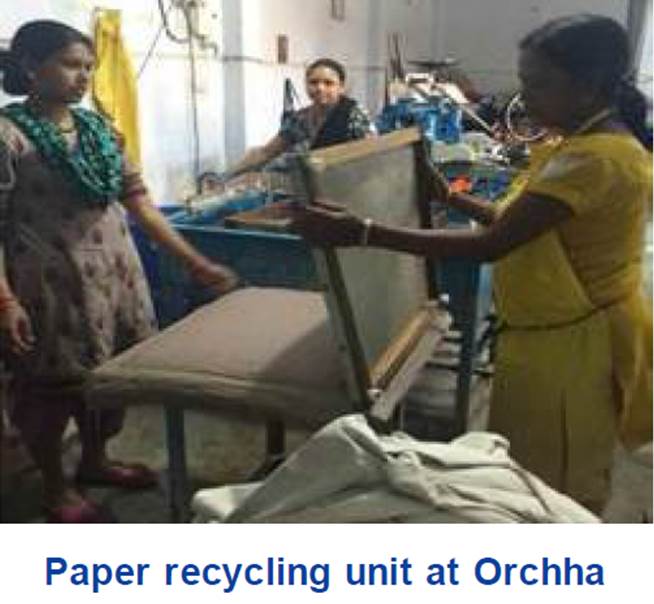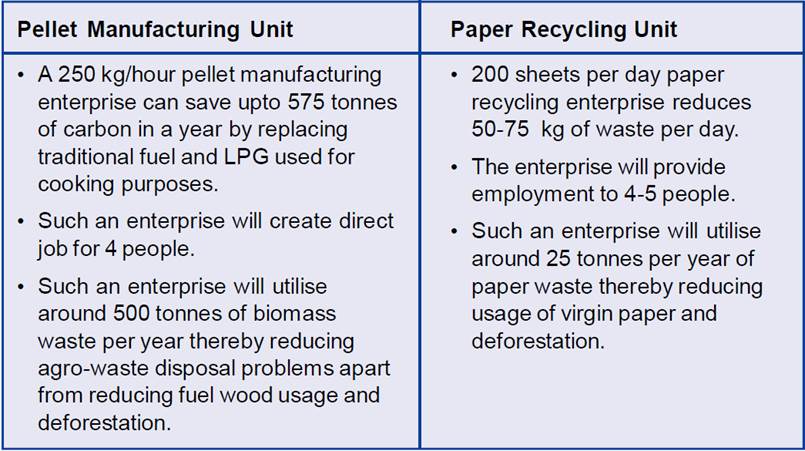|
New Age Enterprises for a Green India
G lobally, the small, micro and medium sized enterprise (SMME) sector generates substantial employment and economic output. These dynamic enterprises are responsible for economic development in several ways such as converting innovative ideas into economic opportunities, re-energising social and productive networks thereby ultimately increasing productivity.SMMEs also account for a large share of pollution and resource use. Therefore, it is necessary that these enterprises incorporate the strategies of ‘Green Economy and Green Growth’ into their production, technology and management systems. Today, India enjoys demographic dividend and has a
large section of young adults poised to add to the working-age
population. However, it faces two major challenges: acute climate change
and massive unemployment. Measures and policies that have been developed
to create a shift towards a low-carbon eco To provide support for green technologies and
innovations, the i-STED (Innovation – Science and Technology based
Entrepreneurship Development) programme, an endeavour of the National
Science and Technology Entrepreneur-ship Development Board (NSTEDB) of
the Department of Science and Technology (DST) and Technology and Action
for Rural Advancement (TARA) has proposed a model called Innovation
based Green Entrepreneur (i-G Preneur) which aims at promoting and
supporting Green Entrepreneurs.
Through this proposed i-G Preneur model, TARA, the social enterprise wing of the Development Alternatives Group facilitates the establishment of eco-friendly micro and small enterprises (MSEs) by application of readily available technology solutions for green entrepreneurs. The focused theme of the programme is ‘waste to weath’, where the efforts are streamlined in setting up of enterprises in the following areas - eco-friendly buildings, packaging and processed fuel solutions. In India, over the next five years, i-G Preneur is committed to develop about 150 eco-friendly MSEs in 3 to 5 clusters in Bihar, Uttar Pradesh and Maharashtra to demonstrate sustainability of the model and create verifiable conditions for its scaling up to 150 and more by aligning interests of different actors, especially to drive the i-G Preneur concept and agenda. Also, it is committed to building an ‘ecosystem’ around the i-G Preneur concept and institutionalising ‘Business Support Service Vehicle’ by promoting and sensitising potential entrepreneurs to enhance tech based entrepreneurship, creating channels for technology acquisition and dissemination, engaging financial institutions for mobilising investment in eco-friendly MSEs and building capacities and skills of different stakeholders to nurture the i-G Preneur model. It is envisaged that the i-G Preneur model will become a key driver behind local economic development. It will help in achieving transfer and adaptation of technological innovations for development of an eco-friendly product portfolio. It is forecasted that in a period of five years the i-G Preneur model will support 150 enterprises and generate products and services of value worth Rs. 3000 lakhs. This model will develop accomplished green entrepreneurs by providing business support services such as capital investment for building eco-friendly MSEs and finally it will enhance economic development by integrating/mainstreaming eco-friendly products and services into the market. For more details please check the website: http://i-gpreneur.com/ qSohina Singh
|
 nomy
have resulted in the development of a number of emerging green
businesses/enterprises such as eco-friendly building materials,
renewable energy, eco-agriculture and green tourism. Policies, laws and
regulations have also been implemented to discourage traditional
enterprises from high-energy consumption, high pollution and high GHG
emissions. As a result, there is a lot of thrust towards green
businesses/enterprises in India.
nomy
have resulted in the development of a number of emerging green
businesses/enterprises such as eco-friendly building materials,
renewable energy, eco-agriculture and green tourism. Policies, laws and
regulations have also been implemented to discourage traditional
enterprises from high-energy consumption, high pollution and high GHG
emissions. As a result, there is a lot of thrust towards green
businesses/enterprises in India.